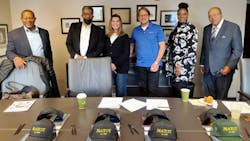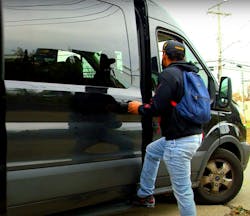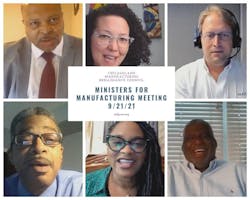Manufacturers Find a Workforce Friend in Black Churches
Craig Freedman is a familiar face in Chicago’s Austin neighborhood. His company, which manufactures seats for buses and marine vessels, is one of the largest employers in the area. About 800 people work at the Freedman Seating plant, which is located in a refurbished old Motorola facility that dates back to the 1930s.
Freedman, the company’s CEO, spends a great deal of time on workforce development, between getting out in the community and working with local manufacturing organizations. He has to, to keep his plant well-staffed and production running.
“It’s just boots on the ground,” he says. “We’re on the West Side of Chicago. It’s one of the most disadvantaged communities in Chicago, if not the country. We believe in this community, and we’ll put all the resources we can into making things better and recruiting from the community.”
Freedman has hosted a healthy cross-section of visitors at his plant in its 25 years in the neighborhood. Students and teachers visit for Manufacturing Day, as well as civic leaders, business groups and high-school counselors.
Neighborhood church pastors, too, have toured the plant. Freedman finds it’s important to connect with Black churches in the predominately Black neighborhood to spread the word about manufacturing careers and the jobs he’s trying to fill.
“The respect that people have for their clergy is enormous,” he says. “And [clergy] can point people in the right direction. That’s why we support it and feel it’s an important element—one of many elements.”
In cities like Chicago and Cleveland, the manufacturing community is reaching out to clergy to help meet workforce needs, and feel it’s a model that others may want to replicate. Manufacturers need workers, and people in underserved communities need jobs. Churches are a community hub where people come not just for worship but also to meet up with their neighbors and connect with services.
Getting People to Work
In Cleveland’s Union-Miles neighborhood on the Southeast Side, getting to work can take hours. About 22% of households lack even one car, according to 2020 Census data, and bus routes from Union-Miles to the suburbs or the other side of town tend to require multiple waits and transfers.
“Unfortunately, there aren’t many manufacturers left in the city of Cleveland,” says Brianna Schultz, vice president of workforce development for Manufacturing Works, a business nonprofit that trains and connects Clevelanders with manufacturing jobs. “They’re in the suburbs now.”
In Union-Miles, the poverty rate was 34.5% in 2022, and 47% of people over age 16 were not in the workforce, according to data from the Census Bureau's American Community Survey.
Schultz and her manufacturing colleagues know about the proximity mismatch between manufacturers and the pool of unemployed and underemployed workers in the city. In 2019, a board member of Manufacturing Works put Schultz in touch with the Rev. Aaron Phillips, who had been trying to help members of his community get jobs. Phillips is the pastor of Sure House Baptist Church in Union-Miles and director of the Cleveland Clergy Coalition, an organization of Black churches that counts “increasing employment opportunities in the African-American Community” as one of its main goals.
Schultz’s organization had never worked with clergy before, but she figured the jobs match would be pretty straightforward. “We thought, ‘Let’s bring together manufacturers who are looking for employees and people who are going through your jobs program,’” she said. “’We can do speed-dating interviews and get some folks some jobs.’
“And you know, the first thing he said was, ‘Wherever it is, it has to be close to the neighborhoods that we’re working in because a lot of people don’t have transportation.’”
The two groups brainstormed and quickly hit on an idea. Phillips had 15-passenger church vans in his parking lot that sat idle most of the week, as they were only used on Sundays and Election Day. Maybe they could use the buses to get people to work.
They applied for and received seed money for the project through the Paradox Prize, a local grant that address the paradox of “No Job, No Car, No Car, No Job.” Manufacturers signed on—Lincoln Electric, Tap Packaging, National Safety Apparel, General Die Casters—agreeing to pay half the transportation cost, with the employees paying the other half (amounting to $5-$10 per employee per ride). Church volunteers drive the vans, picking up passengers at their homes and taking them to work, training programs and job interviews. So far, more than 500 workers have benefited from the program, called Get2Work Now.
Transportation is only part of the puzzle: Through the Clergy Coalition, the Get2Work Now program also provides training in applying and interviewing for jobs. Professionals and retirees in the community (including some of the van drivers), act as sounding boards and advisors for the mentees, “from just keeping them motivated to go to work the next day, to dealing with the issues of the job, like family issues, health issues, pressures of life, mental health,” says Phillips. Mentors also are available to talk with employers.
Burned Many Times
It’s taken Freedman years to build up trust with his community, which is the second-most populous in Chicago and has one of the youngest populations—47% of residents are under age 35.“Our neighborhood has been burned by manufacturing over the years,” he says. “We had Helene Curtis, Brach’s Candy. Many different manufacturers have left, and people have long memories about that.”
In 2022, according to data from the American Community Survey, the Austin neighborhood had a 26% poverty rate, and a 15% unemployment rate among the 57% of residents over 16 who are in the workforce.
Outreach to local churches has been essential to building trust. Freedman is involved in a committee called Ministers for Manufacturing that is part of Manufacturing Renaissance, a Chicago workforce training organization. Clergy, manufacturers and workforce-development facilitators meet quarterly to discuss who needs jobs, who has them and how to break down barriers for new hires to succeed. For instance, one way Freedman increases retention is with an outside “navigator” whom employees can call on with any problems they are having in their work or personal lives. (See sidebar.)
Working with a Navigator
The Rev. Aaron Phillips of the Cleveland Clergy Coalition emphasizes breaking down cultural barriers so both workers and employers understand each others’ approaches, needs and issues. His church uses volunteer mentors to do that job. Freedman Seating takes a different tack: contracting with a navigator from a nonprofit called Work Life Partnership to help employees work through hurdles and help leadership better understand their workers.
“They will engage with any of our employees who choose to reach out,” says Freedman Seating CEO Craig Freedman. “They’ll talk about anything from lack of transportation to housing to financial concerns to childcare. By far, the top issue is transportation to and from work,” both safely and on time.
The employees can access the navigator through a 24-hour phone line, but a navigator also visits Freedman Seating several times a month.
“Let’s say someone’s car breaks down,” says Freedman. “They don’t have the funds to fix it. Well, we started a fund where the individual can go to the navigator and say, ‘Look, my car is broke. Can you help me out?’ And they’ll provide some funds for that. Or, ‘I need a bus pass,’ and we’ll provide them with a bus pass. It doesn’t solve everything, but it certainly goes a long way to help. And it also shows that we’re on their side and we care.”
“Craig has been a tremendous partner,” says David Robinson, vice president of external affairs for Manufacturing Renaissance. “He regularly hires the young people that come out of our training program. He advises us on what they need to actually learn so they can be successful.”
Freedman says that ministers, especially in communities of color in Chicago, have a “fundamental” connection with their neighborhood that can be more effective for workforce development than that of local politicians or state job agencies.
“There’s an education that we have to provide back to the community and say, ‘Look, it’s not like it used to be back in the old days.’ It’s about getting the message out there to influence the next generation that manufacturing can provide a great career.”
A Foot in the Door
The pandemic slowed down Get2Work Now, but it’s up and running again at Phillips’ church, with new nonprofit partners including the city of Cleveland. Currently, it has 15 participants. Others have “graduated”—saved up for a car and now have their own transportation, not to mention several years of on-the-job manufacturing experience.
Phillips says he has plenty of job seekers in the community—what they each need is a foot in the door at an employer. He understands that manufacturers tend to go with what makes their lives easier and what they know—in many cases, employment agencies that take HR and payroll responsibilities off their hands.
But a church program like his that works on a case-by-case basis with employees and manufacturers has its advantages, too (including, of course, that the program is free beyond the transportation cost). The candidates have their community around them as support, and someone to vouch for them.
“People looking for employment is large—and we’re pulling for those folks every day, from all walks of life,” says the reverend.
‘The Harvest Is Plentiful’
Brianna Schultz at Manufacturing Works calls the collaboration with Phillips “a really positive experience.”
“We were able to get in front of people that we normally wouldn’t be able to,” she says. “And it was also interesting to understand the perspective more of some of the people that they were working with. In our mind, success is connecting someone to the training they need and getting them a high-quality, good-paying job and they’re there forever.
“We heard more than once, if someone works somewhere for a week and that means they’re able to pay their electricity bill, that’s a success in their book. And so it was a shift in [thinking].”
Schultz recommends that manufacturers start by seeing whether they have any common connections with a church first, then reaching out. "It’s always easier to get an introduction than it is to cold-call a church and expect them to respond," she says.
“I do think a big piece is just being persistent, showing up and listening, too. When someone says, ‘I’d love this job but I can’t get there until 9 a.m.’ for whatever reason, do your best to find a way to accommodate stuff like. Because it’s usually not an issue of people not wanting to work. It’s that people can’t for whatever reason.”
There’s always room for more in Pastor Phillips’ church vans. “The harvest is plentiful,” he says. “We could fill capacity as much as the need because we have plenty of people. We just don’t have enough jobs for people.”
Main photo: Ministers for Manufacturing members met at Bellwood, Illinois, elevator manufacturer Matot-Kelair for a planning meeting, breakfast and a plant tour. From left: Ed Coleman, retired president of West Side Forward; David Robinson, Manufacturing Renaissance; Catherine "Cece" M. Matot, Owner and Board Chair, Matot; Jim Piper, president of Matot; the Rev. Dr. Tanesha House and the Rev. Anthony Haynes.
About the Author

Laura Putre
Senior Editor, IndustryWeek
As senior editor, Laura Putre works with IndustryWeek's editorial contributors and reports on leadership and the automotive industry as they relate to manufacturing. She joined IndustryWeek in 2015 as a staff writer covering workforce issues.
Prior to IndustryWeek, Laura reported on the healthcare industry and covered local news. She was the editor of the Chicago Journal and a staff writer for Cleveland Scene. Her national bylines include The Guardian, Slate, Pacific-Standard and The Root.
Laura was a National Press Foundation fellow in 2022.
Got a story idea? Reach out to Laura at [email protected]



